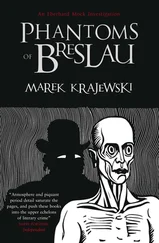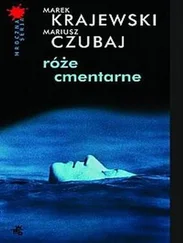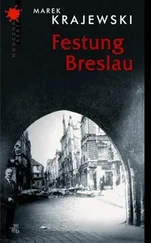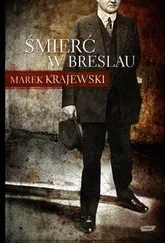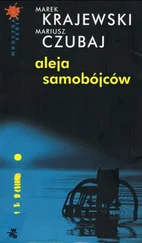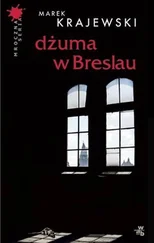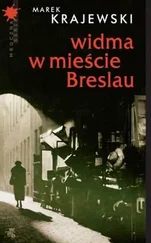Marek Krajewski - Death in Breslau
Здесь есть возможность читать онлайн «Marek Krajewski - Death in Breslau» весь текст электронной книги совершенно бесплатно (целиком полную версию без сокращений). В некоторых случаях можно слушать аудио, скачать через торрент в формате fb2 и присутствует краткое содержание. Жанр: Полицейский детектив, на английском языке. Описание произведения, (предисловие) а так же отзывы посетителей доступны на портале библиотеки ЛибКат.
- Название:Death in Breslau
- Автор:
- Жанр:
- Год:неизвестен
- ISBN:нет данных
- Рейтинг книги:3 / 5. Голосов: 1
-
Избранное:Добавить в избранное
- Отзывы:
-
Ваша оценка:
- 60
- 1
- 2
- 3
- 4
- 5
Death in Breslau: краткое содержание, описание и аннотация
Предлагаем к чтению аннотацию, описание, краткое содержание или предисловие (зависит от того, что написал сам автор книги «Death in Breslau»). Если вы не нашли необходимую информацию о книге — напишите в комментариях, мы постараемся отыскать её.
Death in Breslau — читать онлайн бесплатно полную книгу (весь текст) целиком
Ниже представлен текст книги, разбитый по страницам. Система сохранения места последней прочитанной страницы, позволяет с удобством читать онлайн бесплатно книгу «Death in Breslau», без необходимости каждый раз заново искать на чём Вы остановились. Поставьте закладку, и сможете в любой момент перейти на страницу, на которой закончили чтение.
Интервал:
Закладка:
After this pathetic note followed dreary and learned proofs comparing Friedlander to clairvoyants and various mediums who prophesy in a trance. Anwaldt read Weinsberg’s article to the end with far less attention and started studying the eighty-three interpretations which, held together by brass paperclips, formed a clearly noticeable wad among the other materials and notes. He soon became bored with it. For dessert, he left himself the audio prophecies, sensing that they had something to do with the death of the Baron’s daughter. He set up the gramophone and surrendered himself to listening to the mysterious messages. What he was doing was irrational for, at secondary school, Anwaldt notoriously used to miss extra-curricular lessons in Biblical language and might now as well be listening to an audition in Quechuan with as much understanding. But the hoarse sounds induced in him the same state of morbid unease and fascination as had overcome him when he had first seen the flowing letters of Greek. Friedlander emitted sounds similar to choking. The sounds once purred, once hissed, once a wave forced from the lungs practically ripped the tense larynx. After twenty minutes of this relentless refrain, the sounds broke off.
Anwaldt was thirsty. For a while, he drove away the thought of a frothy tankard of beer. He got up, put all the materials — except the gramophone record — into the cardboard box, and went to the old store of office supplies which, now equipped with a desk and telephone, served the Official for Special Affairs as an office. He telephoned Doctor Georg Maass and arranged a meeting with him. Then he made his way to Mock’s office with the list of gramophone names and his impressions. On the way, he passed Forstner, who had just left his superior. Anwaldt was surprised to see him there on a Sunday. He had a mind to joke about the heavy police work, but Forstner passed him without a word and ran briskly down the stairs. (That’s how someone looks who Mock has caught in a vice.) He was wrong. Forstner had been held in a vice all along. Mock only tightened it from time to time. That is what he had done a moment ago.
BRESLAU, THAT SAME JULY 8TH, 1934
HALF-PAST TWO IN THE AFTERNOON
Standartenfuhrer S.S. Erich Kraus kept professional and private matters neatly apart. He dedicated far fewer hours to the latter, of course, but it was time strictly measured out — Sunday, for example, was held to be a day of rest. Following his post-prandial siesta, it was his habit to talk to his four sons between four and five o’clock. The boys would sit at a huge round table and relate to their father the progress they were making in their work, the ideological activities of the Hitlerjugend and the resolutions which they had regularly to make in the Fuhrer’s name. Kraus would pace up and down the room, comment good-naturedly on what he heard, and pretend not to notice the surreptitious glances at their watches and the suppressed yawns.
But he was not permitted the freedom to spend his first Sunday in Breslau in a purely private capacity. The taste of his lunch was spoiled by the sour thought of General-Major Rainer von Hardenburg, the chief of Breslau’s Anwehr. He loathed this stiff, monocled aristocrat with all his might — he, the son of a bricklayer and alcoholic. Kraus swallowed a delicious schnitzel with onions and felt his gastric juices rise. Furious, he got up from the table, threw his napkin down in a rage, walked through to his study and, for the umpteenth time that day, phoned Forstner. Instead of exhaustive information about Anwaldt, he heard half a minute of a long, intermittent ringing tone. (Where has that son-of-a-bitch gone?) He dialled Mock’s number, but when the Director of Police picked up the telephone, Kraus threw down the receiver. (I won’t learn any more from that obsequious prat than he’s already told me.) The helplessness he experienced in the face of von Hardenburg, whom he had already known in Berlin, was somehow comprehensible to Kraus: in the face of Mock, it was almost contemptible — which is why it so wounded his amour propre .
He paced around the table like a rabid beast. Suddenly, he stood still and hit his forehead with an open palm. (This heat, damn it, is killing me. I can’t think any more.) He sat down comfortably in his armchair next to his telephone. First Hans Hoffmann, then Mock. In a dry tone, he gave both one and the other a number of instructions. The tone of his voice shifted towards the end of his conversation with Mock, from the cold tone of a superior, to the yelling of a madman.
Mock had decided that he would leave for Zoppot that evening. He had made that decision after his visit to Winkler. Kraus’ phone call tore him from his afternoon nap. The man from the Gestapo quietly reminded Mock of his dependence on the secret police and demanded a written report on Anwaldt’s work for the Abwehr. Mock calmly refused. He said that he was due some rest and was leaving for Zoppot that evening.
“And what about your girlfriend?”
“Oh, those girlfriends … Here one minute, gone the next. You know what they’re like …”
“I do not know what they’re like!”
BRESLAU, THAT SAME JULY 8TH, 1934
THREE O’CLOCK IN THE AFTERNOON
Hans Hoffmann had been a secret agent for the police since time immemorial. He had served the Emperor, the Republic police, and now the Gestapo. He put his considerable professional success down to his warm-hearted appearance: a slender figure, small moustache, carefully combed, thin hair, honey-coloured, kind, laughing eyes. Who would have thought that this sympathetic, elderly gentleman was one of the most valued of secret agents?
Anwaldt and Maass, who paid no attention to the neat old man sitting on the neighbouring bench, certainly did not suspect. Maass in particular was unconcerned about the presence of other strollers and pontificated loudly, somewhat irritating Anwaldt not only by his squeaky voice but, above all, by the drastic contents of his confessions which were mostly focussed on a woman’s body and the rapture it entailed.
“Just look, Herbert — indeed, I may call you that, may I not?” Maass went so far as to smack his lips when he saw a young and shapely blonde strolling with an older woman. “How wonderfully that thin dress clings to the girl’s thighs. She’s probably not wearing a petticoat …”
Anwaldt started to be amused by this satyr’s airs. He took Maass by the arm and they began to walk along Liebichshohe. Above them rose a tower, crowned with a statue of the winged Roman goddess of victory. Spurting fountains refreshed the air to a certain extent. The crowd milled around on the pseudo-baroque terraces. The little old man ambled just behind them, smoking a cigarette in an amber cigarette holder.
“My dear man,” Anwaldt, too, allowed himself a degree of familiarity. “Is it true that women become pushy in summer?”
“How do you know?”
“From Hezjod. I’d like to verify a twenty-seven-century-old belief with a specialist. The poet claims that in summer they are mahlotatai de gynaikes, aphaurotatoi de toi andres .” Anwaldt quoted in Greek an extract from Hezjod’s The Works and Days . †
Maass paid no attention to Anwaldt’s sarcastic tone. He was interested in knowing where the Police Assistant had learned his Greek.
“My secondary school teacher of Classical languages was good, that’s all,” Anwaldt said.
After this brief entre’acte , Maass returned to the main topic of his interest.
“Secondary school, you say … Did you know, my dear Herbert, that the schoolgirls of today are pretty well acquainted with the facts of life? I spent a blissful afternoon with one in Konigsberg recently. Have you read the Kama Sutra? Have you heard anything about swallowing the mango fruit? Imagine that this seemingly innocent girl was able to force my steed into obedience when it was just on the point of tearing out of control. I didn’t give her private tuition in Sanskrit for nothing …”
Читать дальшеИнтервал:
Закладка:
Похожие книги на «Death in Breslau»
Представляем Вашему вниманию похожие книги на «Death in Breslau» списком для выбора. Мы отобрали схожую по названию и смыслу литературу в надежде предоставить читателям больше вариантов отыскать новые, интересные, ещё непрочитанные произведения.
Обсуждение, отзывы о книге «Death in Breslau» и просто собственные мнения читателей. Оставьте ваши комментарии, напишите, что Вы думаете о произведении, его смысле или главных героях. Укажите что конкретно понравилось, а что нет, и почему Вы так считаете.

